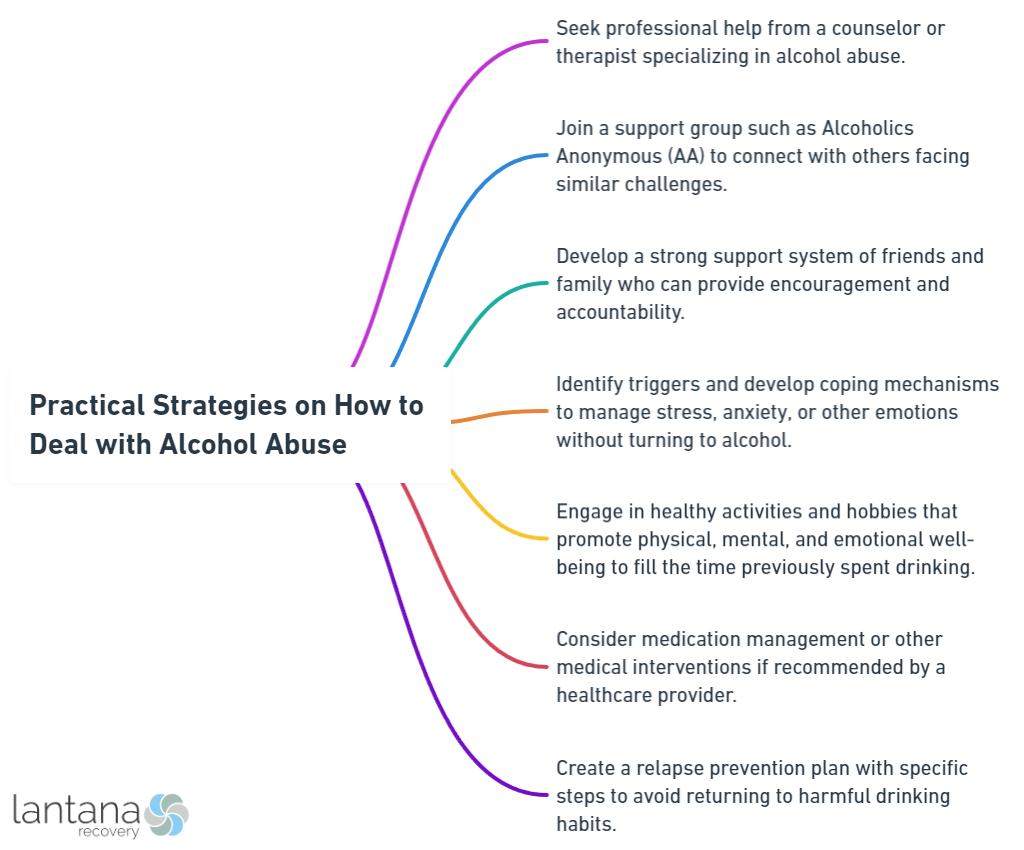Are you trying to figure out how to deal with alcohol abuse, either for yourself or a loved one? You need immediate, practical solutions. This article skips the fluff and dives into concrete strategies to recognize and tackle alcohol abuse head-on. Expect to learn the crucial steps for crafting interventions, uncovering effective treatments, and sustaining long-term recovery without the jargon. With support strategies and financial tips also included, begin your journey to reclaim control and wellness with clarity and confidence.
Key Takeaways
- Identifying the signs of alcohol abuse is crucial for intervention, and acknowledging the presence of an issue is a significant step toward recovery, often challenged by denial.
- Intervention strategies should involve planned discussions with empathetic communication and informed treatment options, while withdrawal should be managed with medical supervision.
- Long-term recovery hinges on personalized treatment plans incorporating medication, behavioral therapies, and support groups, coupled with coping strategies and family involvement.
Recognizing Alcohol Abuse: The First Step to Recovery
Alcohol abuse, also known as Alcohol Use Disorder (AUD), is a medical condition. It is characterized by an impaired ability to stop drinking or control alcohol use despite adverse social, occupational, or health consequences. Recognizing the signs of alcohol abuse is of utmost importance as it serves as the initial phase towards recovery, as understanding the behaviors that signal a problem can lead to effective intervention.
Understanding the Signs
The first step towards help involves identifying the signs of alcohol abuse. The signs include a range of health issues including:
- injuries
- violence
- liver diseases
- mental health issues
Encountering any of the difficulties listed in the Diagnostic and Statistical Manual (DSM-5) related to mental disorders may suggest an alcohol use disorder.
Alcohol abuse, also known as alcohol misuse, can significantly disrupt a person’s capacity to fulfill responsibilities, resulting in diminished performance at work or home, and heightened interpersonal conflict due to consuming alcohol.

Acknowledging the Problem
Acknowledging a problem with alcohol can be a difficult process, but there are specific signs to be mindful of. These signs may involve:
- Comparing one’s drinking patterns to those of others
- Refusing to acknowledge alcohol addiction
- Observing the effects on personal relationships and daily routines
Typical emotional responses when recognizing alcohol abuse may include feelings of guilt, shame, fear, and denial.
Denial significantly impacts alcohol dependence by hindering an individual’s awareness of their condition.
Crafting an Intervention Strategy
Upon acknowledging the problem, it’s time to strategize an intervention. An intervention is a planned process involving family and friends of the person struggling with addiction, aimed at motivating the person to seek help. This strategy involves effectively communicating with the person, expressing empathy and understanding, and offering support and encouragement.
How to Get Help with Alcoholism
In exploring how to get help with alcoholism, it’s critical to first accept the problem and seek professional guidance. This includes consulting healthcare experts, joining groups like Alcoholics Anonymous, or checking into rehabilitation centers focused on alcohol treatment. Effective recovery often involves a combination of therapy, medication, and community support.
Planning the Discussion
The process of planning an intervention encompasses understanding alcohol use disorder, recognizing signs of alcohol problems, engaging family and friends, and reaching out for professional help.
The goals for alcohol intervention should be specific, measurable, attainable, relevant, and time-bound to develop a clear and actionable plan for the recovery journey.
Communicating Effectively
The success of an intervention is significantly influenced by effective communication. Expressing support and concern can help the person realize they have a problem with alcohol and would benefit from addiction treatment. Incorporating examples of negative consequences during an intervention also helps in making the person aware of the impact of their addiction.
Offering solutions by presenting details about treatment options, including rehab programs, counseling, and support groups, can also be beneficial.
Exploring Treatment Options for Alcohol Dependence

Following the person’s acknowledgement of the problem and willingness to seek help, it’s time to delve into treatment options. Options for professional treatment include behavioral therapies, medications, and mutual-support groups. These approaches can provide individuals with the support and tools they need to address their specific needs. It’s important to understand that treatment needs to be customized based on individual requirements.
Navigating Professional Treatment
Treatment for alcohol dependence typically engages a multidisciplinary team of health professionals, encompassing primary care providers, mental health professionals, and addiction specialists. They provide a structured process conducted in inpatient or outpatient treatment facilities.
It is vital to understand your insurance coverage to know your financial obligations for addiction treatment and the accessibility of treatment options.
Medication and Behavioral Therapies
Medication and behavioral therapies offer promising outcomes in managing alcohol dependence and promoting long-term recovery. FDA-approved medications for alcohol dependence include Naltrexone, Acamprosate, and Disulfiram, which are designed to manage withdrawal symptoms and alcohol cravings.
Behavioral therapies encompass various strategies, including family therapy, which integrates family members into the treatment process to enhance relationships and promote abstinence.
Support Groups and Peer Networks
Long-term recovery from alcohol dependence heavily relies on the role of support groups and peer networks. Given the chronic relapsing nature of alcohol use disorder, it is imperative for individuals to remain committed to their chosen treatment approaches.
Addressing Alcohol Withdrawal Safely

Alcohol withdrawal is a challenging part of recovery. It is characterized by a number of symptoms that can range from mild to severe, and in some cases, can be life-threatening. Therefore, it is important to address alcohol withdrawal under the supervision of a health professional or in a medical detoxification program. Some common symptoms of alcohol withdrawal include:
- Anxiety
- Sweating
- Nausea and vomiting
- Headache
- Insomnia
- Tremors
- Hallucinations
- Seizures
If you or someone you know is experiencing alcohol withdrawal, seek medical help immediately.
Recognizing Withdrawal Symptoms
The initial step to managing alcohol withdrawal involves identifying the symptoms. Symptoms include:
- anxiety
- shakiness
- sweating
- nausea
- vomiting
- insomnia
- headache
- irritability
- fatigue
- loss of appetite
- depression
- difficulty concentrating
Severe alcohol withdrawal symptoms have the potential to result in fatality during the recovery process.
Medical Detoxification Programs
Medical detoxification programs provide a safe environment and medical supervision for managing withdrawal symptoms. A medical detoxification program for alcohol dependence involves a structured process conducted in inpatient or outpatient treatment facilities. These programs are overseen by a multidisciplinary team of medical professionals who closely monitor the patient’s condition and provide essential support.
Developing Coping Skills and Relapse Prevention Strategies

Sustaining long-term recovery necessitates the development of coping skills and relapse prevention strategies. Some fundamental self-care practices that can aid in preventing relapse include:
- Consistent physical activity
- Maintaining a balanced diet
- Practicing meditation
- Fostering positive self-talk
Establishing Healthy Routines
Recovery is significantly predicated on the establishment of healthy routines. Regular exercise, a healthy diet, and good sleep hygiene not only improve physical health but also contribute to mood improvement, craving reduction, and enhanced self-esteem.
Equipping oneself with stress management techniques can also aid in preventing relapse during the recovery from alcohol addiction.
Creating a Relapse Prevention Plan
The creation of a relapse prevention plan is pivotal to the maintenance of long-term recovery. This includes:
- Self-assessment and reflection
- Recognizing triggers and warning signs
- Planning for the worst
- Involving others
- Setting goals
- Attending therapy sessions regularly
Supporting a Loved One Through Recovery

It can pose a challenge to support a loved one throughout their recovery. It requires understanding, patience, and commitment. It’s also important to take care of your own well-being and not enable the person’s addiction.
Setting Boundaries
The act of setting boundaries is a significant part of providing support to a loved one in recovery. Boundaries are key to safeguarding your well-being and encouraging your loved one to take responsibility for their actions.
This might include setting limits on behaviors you’re willing to accept, or stipulating that you won’t cover up for their mistakes.
Participating in Family Therapy
Family therapy can be beneficial in managing alcohol addiction. It offers the following benefits:
- Improves communication
- Reduces conflict
- Strengthens relationships
- Addresses underlying issues
- Fosters a healthy family environment
- Offers support, education, and guidance to family members.
Family therapy equips family members with the necessary skills to enhance communication, implement new interaction methods, and embrace constructive relational behaviors.
How to Help an Alcoholic in Denial
Navigating how to help an alcoholic in denial can be a delicate process. It’s crucial to approach them with understanding and without judgment. Expressing concerns gently and providing specific examples of the negative impacts of their drinking, while suggesting professional assistance, is essential. Avoiding behaviors that enable their alcohol consumption and seeking support for yourself are also important steps.
Financing Addiction Treatment
Financing addiction treatment can be a significant concern for many individuals and families. Understanding your insurance coverage, exploring government-funded programs, and seeking affordable treatment providers can alleviate some of this burden.
Understanding Insurance Coverage
When planning for addiction treatment, it’s important to comprehend your insurance coverage. Most health insurance plans cover behavioral health treatment such as:
- psychotherapy
- counseling
- mental and behavioral health inpatient services
- substance use disorder treatment
It’s essential to contact your insurance provider to inquire about the specifics of your coverage.
Locating Affordable Treatment Providers
There are affordable treatment providers available for those who need them. Some treatment centers offer sliding scale fees based on income. There are also government-funded programs and non-profit organizations that provide cost-effective treatment options.
Staying Informed: Alcohol Abuse Resources and Education
In the journey of recovery, education serves as a potent tool. It’s essential to stay informed about alcohol abuse resources and treatment options. There are various reliable sources available that offer accurate information on alcohol abuse and treatment options.
Reliable Information Sources
Reliable sources of information on alcohol abuse and treatment options include government websites like the National Institute on Alcohol Abuse and Alcoholism (NIAAA), Substance Abuse and Mental Health Services Administration (SAMHSA), and FindTreatment.gov. In addition, leading research institutions such as Brown University’s Center for Alcohol and Addiction Studies, and Rutgers University’s Center of Alcohol & Substance Use Studies provide authoritative studies on alcohol abuse.
Educational Programs and Workshops
Engagement in educational programs and workshops can bolster your comprehension of alcohol abuse and available treatment options. Organizations like the National Institute on Alcohol Abuse and Alcoholism (NIAAA) and the Substance Abuse and Mental Health Services Administration (SAMHSA) offer credible educational programs.
Engaging in these programs can provide you with knowledge and resources to understand the implications of alcohol abuse and techniques for recovery and maintaining sobriety.
Summary
Alcohol abuse is a complex issue that requires understanding, commitment, and a supportive environment for successful recovery. Recognizing the problem, crafting an intervention strategy, exploring treatment options, addressing withdrawal symptoms safely, developing coping skills, supporting a loved one through recovery, financing the treatment, and staying informed are all crucial steps in the journey to overcome alcohol abuse.
Frequently Asked Questions
What vitamin deficiencies do alcoholics have?
Alcoholics often have deficiencies in vitamins such as folate, vitamin B6, thiamine, and vitamin A, due to factors like reduced hepatic concentrations and inadequate dietary intake. These deficiencies can be a result of chronic alcoholism and may require additional nutritional support.
What is Alcohol Use Disorder (AUD)?
Alcohol Use Disorder (AUD) is a medical condition where individuals struggle to control their alcohol consumption despite negative consequences.
What are the signs of alcohol abuse?
Signs of alcohol abuse can include health issues such as injuries, violence, liver diseases, and mental health problems. It’s important to recognize these signs and seek help if needed.
What is an intervention?
An intervention is a planned process that involves the person’s loved ones in order to encourage them to seek help for addiction.
What are the treatment options for alcohol dependence?
Treatment options for alcohol dependence include behavioral therapies, medications, and mutual-support groups, which can help individuals manage their condition effectively.









